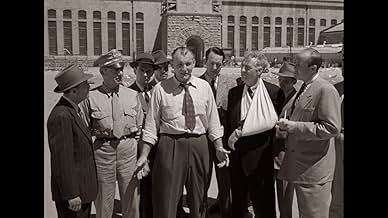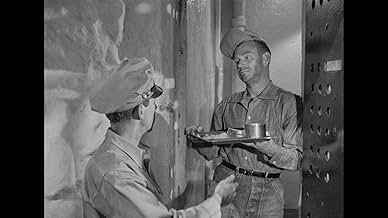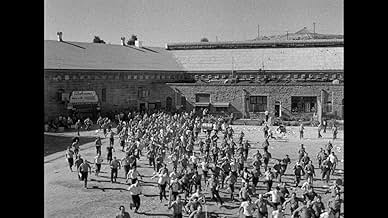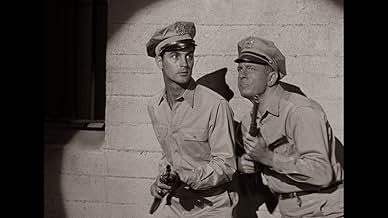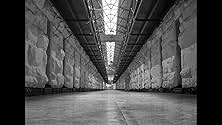Ajouter une intrigue dans votre langueFed up with the inhumane prison living conditions, a general prison riot breaks out, leading to hostage-taking, a stand-off with the guards and eventual negotiations with the prison administ... Tout lireFed up with the inhumane prison living conditions, a general prison riot breaks out, leading to hostage-taking, a stand-off with the guards and eventual negotiations with the prison administration officials.Fed up with the inhumane prison living conditions, a general prison riot breaks out, leading to hostage-taking, a stand-off with the guards and eventual negotiations with the prison administration officials.
- Nomination aux 2 BAFTA Awards
- 3 nominations au total
Avis à la une
Tho what is known as a "B" movie, and with a budget to match such a programmer, Riot In Cell Block 11 remains today one of the finest entries in the incarceration based genre of film. As relevant today as it was back then, the film has much grit and realism coursing thru its veins. Directed by Don Siegel (Dirty Harry/Escape From Alcatraz), it's written by Richard Collins (uncredited on Invasion Of The Body Snatchers), but it's with producer Walter Wanger that the core of the piece belongs. In 1951 Wanger was convicted of the attempted murder of Jennings Lang. Lang was having an affair with Wanger's wife, and when Wanger caught them in the act, he shot Lang in the groin. Wanger, after copping a plea of temporary insanity, served four months in San Quentin Prison, where his experiences there provided the genesis for Riot in Cell Block 11.
Shot in a semi-documentary style on location at California's Folsom Prison, Siegel and Wanger used actual inmates and guards to authenticate their movie. This was made possible by a certain Sam Peckinpah, who here was doing his first film work as a third assistant director. Legend has it that the Warden of Folsom knew "Bloody Sam's" family and thus allowed the makers into the prison to film. The film also benefits by not having big name stars filling out the cast, Brand & Meyer are joined by Frank Faylen, Leo Gordon, Robert Osterloh, Paul Frees & Whit Bissell. Solid performers to a man, but no headliners, and this helps, as they mix with the real crims and coppers, the realistic feel the makers created.
Siegel's movie isn't looking for simple answers to a persistent problem, it could have easily just gone for a death or glory violent piece of entertainment. But instead it's laced with intelligence and never sinks to preaching, in fact its finale is a rather sombre footnote to the whole episode. The characters are excellently drawn too, and it's good to see that Collins and co don't just make this a cons against authority piece, they clash with each other. Thus hitting home that not all the cons are singing off of the same page. As Warden Reynolds tells when asked about riot leader Dunn, "he's a psychopath, but he's an intelligent psychopath - just like many others on the outside" it's a telling piece of writing. As is the fact that there's no soft soaping either, there's no redemptive love interests or old sage lags to talk common sense into the ring leaders, it's tough uncompromising stuff.
And while we are noting the need for reform, feeling a bond with the prisoners complaints, we are then jolted to not forget that evil men do still reside here. Evil that is perfectly essayed by an excellent Leo Gordon (a real life San Quentin resident) as Crazy Mike Carnie. Watch out for one scene involving a call to a guards wife, the impact is like taking a blow from a claw hammer. You will understand why Siegel said Gordon was the scariest man he ever met.
A top draw movie that doesn't take sides, it has both sides of the fence firmly in its sights. With us the public observing from the middle. 10/10
If I have a complaint about the movie, it would be that none of the characters are really examined deeply. I would have liked to have learned more about some of the ringleaders of the riot, as well as some of the guards. Though such deeper examinations might have made the movie much longer than the lean yet efficient eighty minute running time, and the movie might have dragged. But that's a minor problem; the movie as a whole works very well.
The prisoners make their demands known, and they want them printed in the papers for all the public to see. They want to be involved in a work program instead of sitting idle; they want the jail to be less crowded and better organized. If their needs are not met, guards will be killed, and the blame will be placed on the penal system authorities. The liberal warden of the prison actually wants to grant their demands, but his budget is constrained by politicians far removed from the system, and thus he is helpless as the clock ticks down.
The film is non-stop excitement and drama. I liked seeing the relationship between the prisoners, and their roles in the revolt. Neville Brand, with a gravelly voice and a build like a Sherman tank, is perfectly cast as the group leader and negotiator.
The movie is based on a story of an actual prison riot in the 1950s, and producer Walter Wanger's experiences as an inmate. Isn't it odd that celebrities get religion on the issue of prison reform AFTER they have been behind bars? Dan Rostenkowski comes to mind too.
When the film begins, there is a preachy prologue about prison riots and how they are the fault of the politicians and the people for allowing prisons to become that rotten. While to some extent this is true, the message come on about as subtly at a baseball bat against your skull. Then the film begins, a fictionalized account of prisoners rioting at a prison and the ineffectiveness and duplicitous nature of public officials in dealing with it. Again and again, the Warden advises for restraint and seems very much in agreement with most of the prisoners' demands...and time and again, the powers that be think the best way to handle the prisoners is to bluster and lie.
So if the film comes off as a bit preachy, why do I still give it a 7 (and I was tempted to give it an 8)? Well, the acting is really terrific. Neville Brand is great as the prisoner in charge of the rioters and the rest of the actors did a really nice job. Had the message been toned down a tad, the film might have earned a 9.
The droning voice-over that opens the movie doesn't bode well: It warns of a wave of riots throughout penitentiaries across the country and even takes us to a criminal-justice convention in Toronto where the topic is aired. But soon we're inside Cell Block 11, part of a run-down, overcrowded institution whose warden (Emile Meyer) has been campaigning for reforms, to no avail. (Standing up for convicted criminals, then and now, is political suicide.) When opportunity knocks, the inmates take over the asylum. What they want is press coverage of their quite moderate demands: More elbow room, separate facilities for the mentally ill among them, job training. But they've taken guards as hostages, and threaten to execute them if their demands aren't met.
Leader of the rebels is Neville Brand, who tries to negotiate in good faith, but Meyer has one hand tied behind his back by Frank Faylen, a hard-line state bureaucrat. Brand, too, has trouble keeping the prisoners in line, particularly those who see the riot less as a cause than as a chance for some cheap thrills. Siegel manages to keep the story taut within the claustrophobic confines of the prison and without too much in the way of splashy incident, until he brings it to a surprisingly rueful end. Somehow, he has managed to make an issues movie told almost solely through action.
Siegel's career proved that he had more sides to him than he's generally known for. He started out cutting montages in other directors' movies (Blues in the Night and The Hard Way among them); when he moved into directing, his early work showed range in style and tone: The period thriller The Verdict, the light-hearted noir The Big Steal, the eschatological drama Night Unto Night. Too bad we can't remember him by saying that he just got better and better, because, unfortunately, it just isn't so.
Le saviez-vous
- AnecdotesLeo Gordon had served five years for armed robbery at San Quentin State Prison. For this reason, Heinze, the Folsom warden, originally objected to Gordon appearing in the film, but director Don Siegel was able to convince him that Gordon was no threat to the prison.
- GaffesWhen the state police force the convicts back into the prison by launching a barrage of tear gas at them, the police move forward, into the area being bombarded. The convicts are overcome by the gas, but the police aren't - even though they're not wearing gas masks and are enshrouded by the same gas the convicts are.
- Citations
Warden Reynolds: I promise you no harm will come to you during this conversation. Guard! These are my instructions. Dunn is to be allowed to come into this yard and return to 11 without interference.
- Crédits fousThe following acknowledgment appears after the opening credits: "We wish to thank Mr. Richard A. McGee and his staff of the California Department of Corrections, Warden Heinze, Associate Warden Ryan, Correctional officers and the inmates of Folsom Prison for their co-operation."
- ConnexionsEdited into Les assassins meurent aussi (1955)
Meilleurs choix
- How long is Riot in Cell Block 11?Alimenté par Alexa
Détails
- Date de sortie
- Pays d’origine
- Langue
- Aussi connu sous le nom de
- Riot in Cell Block 11
- Lieux de tournage
- Société de production
- Voir plus de crédits d'entreprise sur IMDbPro
Box-office
- Budget
- 298 780 $US (estimé)
- Durée
- 1h 20min(80 min)
- Couleur
- Rapport de forme
- 1.37 : 1

